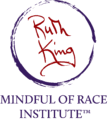I grew up playing a card game called bid whist, popular among African Americans. Four people play this game, representing two pairs. The cards are dealt face down and six cards are placed in what is called a kitty. After a review of what has been dealt to you and a wild guess after reading the face of your partner, you either bid or pass on the kitty. You bid when you think you can win the game and that your partner and/or the kitty will somehow have the cards you don’t have. You pass when the cards dealt to you don’t look promising for a win. Sometimes, when you pass, your partner will bid, and between the two of you and the kitty, you win or lose. And sometimes you discover you can pass and still win by playing the cards you were dealt in a smart way against your opponent.
This strategy applies to our relationship to racial distress. You are dealt a situation face down that you can’t ignore. Your partner and the kitty in this game is uncertainty, and you are playing against the opponents of injustice. After looking at your cards, you must determine what action you will take. But here is the crucial turning point: you must decide, because even when you don’t make a choice, you are making a choice.
It is wholesome to be discerning. I acknowledge that using a card-game metaphor may be too casual for the seriousness of race and racism but hang with me for a few more pages. What I am basically attempting to illustrate is that we can’t bid every hand we are dealt—we can’t confront every injustice or address every need—and still stay in balance or in the game.
I once coached a high-profile, forty-two-year-old black woman in corporate America who had been put on several committees to represent the company’s diversity initiative. She felt this was important work and, given her position, that she was the only one who could and should do it. This diversity work was in addition to her demanding job, which included international travel and being away from her husband and two young children. She asked me to support her with balance, which was challenging, as she repeatedly rescheduled our coaching sessions. When we did meet, she was often distracted and anxious about what she had not taken care of. She wanted support, but she didn’t see how it could fit in with her other demands.
On one chilly morning, I received a call from her assistant with the news that my client had had a massive stroke. When I visited her in the hospital, she could not speak, but I could see in her eyes that her cry for recovery was as demanding as her cry of regret. Family and friends surrounded her with love and care, but she never recovered. She passed away five days later.
I was quite disturbed for several weeks. This loss represented a constellation, not a star—not a single incident. Whether its social activism or raising a family, too many of us are harming ourselves. Our habits of mind are often out of proportion to what our body and heart need or can handle. We must be more honest with ourselves and not let our ego deceive us into believing that we can be all things to all people.
Choosing to Bid
As bodies of color, we are dealt unlimited opportunities to challenge racial inequity and harm. For example, if you are having a conflict with a friend or colleague and you want to maintain, or even deepen, the relationship, you bid. You may want to intervene at the individual level and speak directly to the conflict between you. Using the “talking about what disturbs you” guideline (see Chapter 14) could be useful to apply in such situations.
There are times when you will want to address the group identity level and speak to the dominant and subordinated racial dynamics that feed oppression. In such instances, it’s not about you or your feelings, nor is it about what an individual is doing. You are speaking as a racial group member to another racial group or member, and you are acknowledging racial group behavior and patterns of harm. In such situations, you can apply the “six hindrances to racial harmony” (see Chapter 4) as your bid.
Then there are situations that warrant institutional intervention—when individuals or racial groups come together to form a movement or join a cause that addresses systemic and structural racism. Black Lives Matter, MoveOn.org, Indivisible, and the Love Army are some recent examples. We bid when we join groups to support others, share resources, oppose policies and practices that cause racial harm, and propose practices that foster equity and well-being.
The word bid might feel strange or a bit too quirky, but consider this: bid is another word for choosing, saying “yes,” or saying “hell no.” Your partner is uncertainty; you are not in complete control of the outcome, and you are playing to transform racial obstacles—your opponents. To bid is to be open to learning how to play the game more skillfully. You may not always win the game but will inevitably become more aware and become a better player.
Choosing to Pass
Too many of us are out of balance. We overextend without realizing that we live in a body, ignoring the call to be nourished. We must find time to rest from our wounding and from clear seeing, to reflect, and to heal. Yet many POC I speak to feel as though it is a luxury to take a break from the challenges in their lives. Resting is not a betrayal; it is a restorative necessity.
To come into balance is to learn how to pass. We pass when we choose to withdraw effort—to not expend energy outward, to not be on hyper alert twenty-four/seven, and to bring ourselves into balance through a devotion to self-care.
Often, to pass means you learn to rely on your bid whist partner—uncertainty—to carry more of the weight for a while. This requires that you develop a more intimate relationship with uncertainty and with ease.
There are many ways to contemplate a relationship with these mind states. Most spiritual traditions have practices that support such well-being, such as prayer, inspirational readings, songs, wise teachings, or dance. Explore practices that bring you into balance and that support you in strengthening inner resources of well-being.
I encourage bodies of color to attend a Vipassana or insight meditation retreat at least once a year. Within a ten-day retreat structure, through periods of silence, sitting, and walking meditation, we are supported in slowing down and noticing the workings of our heart and mind. We begin to see more clearly the nature of mind, and we experience more inner stability, confidence, and well-being. With practice, we notice increasing moments of release from distress and how freedom is not a destination outside of our own mental creation.
An insight meditation retreat fuels moral reflection. It strengthens our capacity to examine personal and cultural habits of mind and what it is like to release them. It reveals a gradual and natural unveiling of the truth of suffering, and it further supports us in cultivating a heart we can learn to trust and rest in. Knowing these experiences directly is restorative and brings balance to our lives.
When I encourage bodies of color to attend an insight meditation retreat, it is often difficult for us to pause and embrace the idea or to take the time. But rarely is it a waste of time. Many insight retreats are offered freely, while other retreat centers provide scholarship support. As one participant of color shared, “Meditation helps to keep my mind in the present and not ruminate about my past. It helps to calm my mind from obsessive thinking, which leads to anxiety. I’m currently learning how to cope and grieve my current circumstances while still working on gratitude and self-love.”
As POC, it is essential that we know the taste of freedom and pursue it. An African American woman shyly approached me at the end of a ten-day retreat. Her voice was soft when she whispered, “Is it okay to be happy?” Her eyes smiled, and her face was radiant. She said, “In this moment, I’m happier than I have ever been! Is it really okay to allow it?” She was not really looking for an answer, just a witness—a face that looked like hers. We just smiled together, enjoying happiness together, as we looked caringly into each other’s eyes. Insight meditation retreats are one way for us to answer our deepest questions, even the ones that have no answers.
Another way to “pass” is to retreat with each other. Self-organizing a retreat allows us to share our diverse experiences, traditions, and ceremonies and to talk to each other about what hurts and what heals. Too many of us are afraid of looking weak or vulnerable or of being disappointed or feeling unworthy. We worry that in asking for help we are taxing an overtaxed community with one more burden. Such beliefs need to be tested. I know many POC who have received more care than they can bear. In fact, they discovered that although asking for support was difficult, what was more difficult was receiving it. There is much talent among us. Allowing ourselves to be cared for is a practice we can learn to do well. We need not be ashamed of being human.
In exploring how we use our energy—whether we bid or pass—we discover that it is not about either/or rather it is about both/and. We need balance—self-care and engagement. It is a win-win practice.


Beautifully put Ruth. Self care is the Superpower of our time.
In my experience and cultivation of developing a relationship with balance and gentleness, I am actually feeling the healing of myself and my Lineage both behind and infront of me.
Such freedom and liberation all from caring deeply for my own needs and allowing Joy.
Thank you for sharing this gift.
Love, Light & Laughter
Clairessense
✨️💖💫